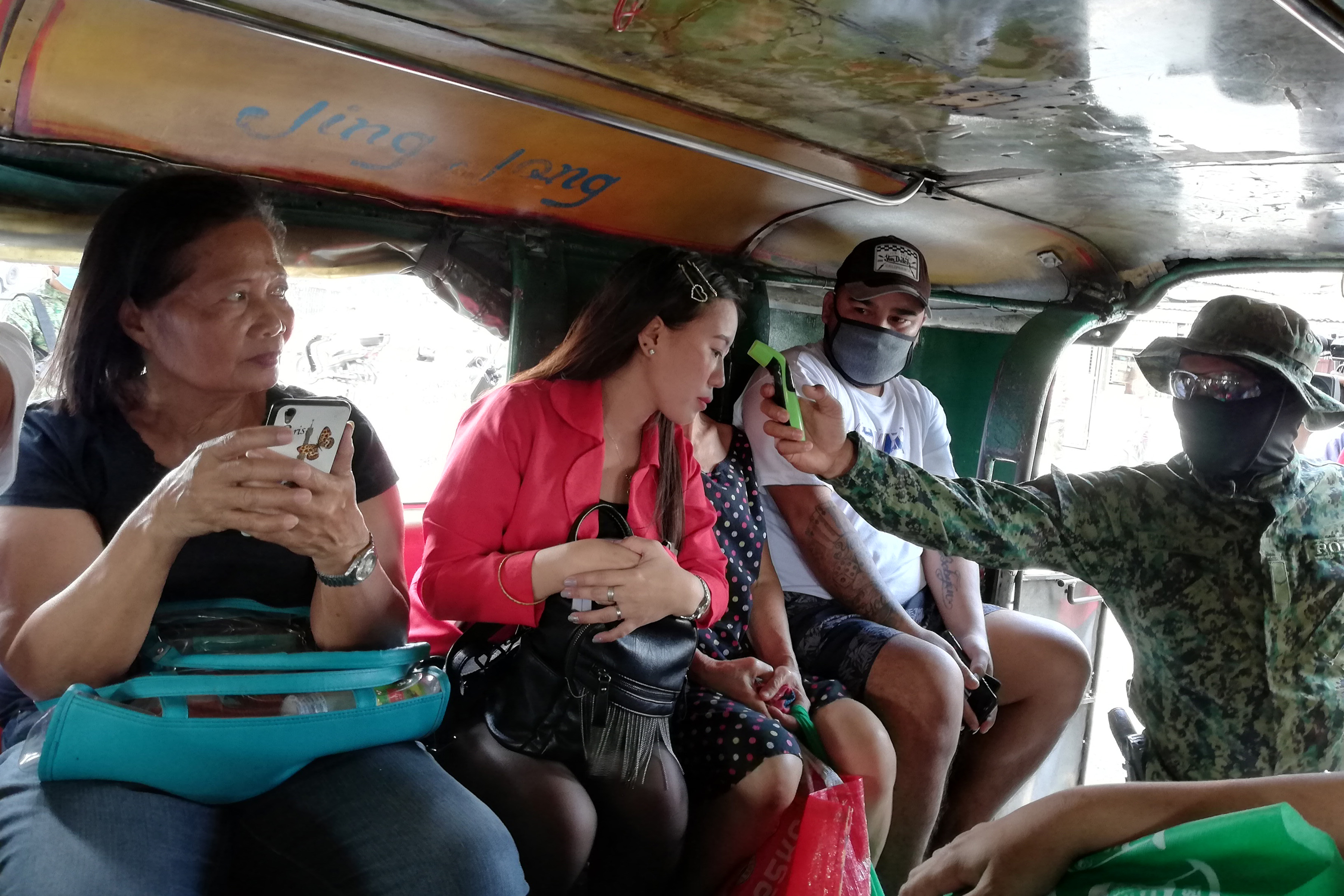Headline
Rate of coronavirus spread to determine govt’s next step

COVID-19 TEST. A member of the Joint Task Force-National Capital Region checks temperature of people in a passenger jeepney using thermal scanner as the 30-day ‘community quarantine’ in Metro Manila begins on Sunday (March 15, 2020). The community quarantine was implemented to contain the spread of coronavirus disease or Covid-19. (PNA Photo By Avito C. Dalan)
MANILA — Malacañang said the rate of the spread of the new coronavirus disease (Covid-19) infection will determine whether the government will consider implementing a “complete lockdown” in Metro Manila.
Presidential Spokesperson Salvador Panelo made this remark as the number of confirmed cases of Covid-19 as of Sunday night soared to 140 with 12 deaths during the first day of the implementation of the month-long “community quarantine” which will end on April 14.
“Iyon talaga ang magiging konsiderasyon (Those are what is being considered — how fast people are being infected, how fast people are being exposed from infected people),” he said in an interview over DZMM on Sunday.
He said if a complete lockdown is necessary to control the spread of the disease, it would be considered.
“Kung kinakailangan tayong mag complete lockdown na, magla-lockdown na tayo, sapagka’t exponentially, kapag nagkahawaan tayo ay talagang mauubos tayo (If there is a need to have a complete lockdown, we’ll have a lockdown. Because exponentially, if we infect each other we’ll be wiped out),” he said.
Regardless of the term used, he said what is important is to prevent contagion in the entire country.
“Whether you call it lockdown or whatever, ang importante hindi tayo magkahawaan. Iyan ang pinakaimportante rin, hindi na mahalaga kung anong itatawag mo diyan (what’s important is we don’t infect each other. That’s what’s important, not what term it’s called),” he said.
However, he clarified that it will depend on daily assessments and recommendations of the Inter-Agency Task Force for the Management of Emerging Infectious Diseases which will be convening again on Monday.
“Pinag-uusapan at ini-evaluate araw-araw iyong mga kaganapan. Kung ano ang makakabuti sa ating lahat iyon ang gagawin natin (We are discussing and evaluating the developments. We’re going to do what’s best for all of us),” he said.
The decision whether or not to implement a complete lockdown, he said, could also be reached if the task force feels that the current community quarantine might be insufficient to control the spread of the highly-infectious disease.
“Kasama iyon sa pag-uusapan bukas (Monday) kung ito ba ay sufficient na iyong ginagawa natin o kailangan pa nating mas istrikto iyong ating gagawin dahil (Among topics to be discussed is whether or not what we’re doing now is sufficient or if we need to be stricter because) — again, we will repeat, this is a matter of national survival, it’s a matter of life and death. We really have to do something about ourselves otherwise, damay-damay tayong lahat dito (we’ll all be infected),” he said.
Despite these possible options, Panelo, citing Interior Secretary Eduardo Año, said people have been “cooperative” during the first day of community quarantine with notably fewer people in the streets.
The community quarantine, which will be in effect from March 15 to April 14, limits people’s movement to “accessing basic necessities and work” and place uniformed personnel and quarantine personnel at border points.
People outside Metro Manila are barred from entering the region, unless they are workers, departing passengers, and individuals aboard vehicles carrying cargoes.
Metro Manila residents are also required to observe strict social distancing and avoid mass gatherings.
It also suspends land, air, and sea travel to and from Metro Manila and classes at all levels.
Amid criticism over the month-long community quarantine, Año denied that there is an absolute lockdown in Metro Manila, saying that the movement of the people is merely “restricted” and that there could only be an absolute lockdown if “enhanced” community quarantine is implemented.
Interior Assistant Undersecretary Jonathan Malaya said community quarantine was intended to “save lives” following the World Health Organization’s warning that the number of Covid-19 cases in the Philippines might reach 75,000.





















